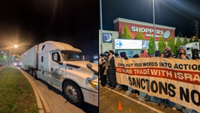A Shifting Narrative: Economic Instability Amid Geopolitical Unrest
Recent events have sparked a conversation that goes beyond the immediate concerns in Gaza, reaching into the core of modern capitalist systems. A notable incident involving a pro-Palestine activist drawing attention to an Ontario food terminal blockade exemplifies how some protests are evolving to critique economic structures rather than focusing solely on geopolitical conflicts.
Beyond the Conflict in Gaza
While the situation in Gaza remains a significant flashpoint, many observers are noting that current demonstrations are not confined to issues of territorial or political rights. Instead, the events highlight wider systemic problems. Activists are increasingly framing their actions as a response to what they see as the unsustainable nature of contemporary capitalism—an economic system that, they argue, prioritizes profit over human well-being.
The Ontario Incident as a Microcosm
The blockade at an Ontario food terminal has emerged as a symbol of this growing discontent. Though initially appearing to be a straightforward act of protest in support of Palestine, the incident quickly evolved into a broader critique of current economic practices. Participants in the protest point to the vulnerabilities in supply chains and the overall fragility of the economic system, arguing that such disruptions expose deeper issues within modern capitalism.
Capitalism Under Scrutiny
Critics contend that the very structures of capitalism facilitate not only wealth inequality but also systemic instability. Events such as the food terminal blockade serve as a wake-up call, urging the public to consider whether the economic model in place can sustain the growing demands of social justice and global stability. According to this perspective, the protests are as much about envisioning a different, more equitable economic system as they are about addressing an international conflict.
Reevaluating Priorities
This emerging narrative suggests a dual struggle: one that encompasses both traditional geopolitical conflicts and the internal challenges posed by economic systems. The evolving protest dynamics indicate that many activists are now linking local actions to a broader call for change—a change that seeks to rebalance power structures and address longstanding inequalities.
Looking Ahead
As discussions continue, it remains to be seen how these intertwined social and economic grievances will shape future activism. What is clear, however, is that the protest movement is growing increasingly complex. By questioning the foundations of capitalism alongside established political conflicts, activists are redefining what issues are most urgent in an interconnected world.

Embracing Faith, One Insight at a Time!
The teachings of the Quran have always guided my path. With a deep passion for Islamic knowledge, I strive to blend the wisdom of tradition with the relevance of today, making the timeless messages of Islam accessible and meaningful for everyone.
Muslim Culture Hub is my platform to share historical insights and thought-provoking articles, exploring both well-known and lesser-discussed aspects of Islamic culture and beliefs. My mission is to create an inclusive online space where everyone can learn, strengthen their faith, and connect with the profound message of Islam.
Join the journey!
May peace be upon you.








